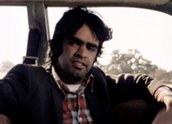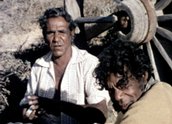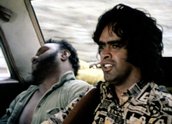


Backroads (1977)
Synopsis
Two strangers – one white, one black – steal a car in western New South Wales and head for the coast. Jack (Bill Hunter) is abrasive, cunning and disparaging about Aborigines. Gary (Gary Foley) doesn’t really care – he just wants to escape. En route, they pick up Gary’s Uncle Joe (Zac Martin), a French hitchhiker (Terry Camilleri) and a young woman (Julie McGregor) who’s running away. Their petty crimes escalate as they go, heading towards disaster.
Curator’s notes
Backroads is one of the more significant unseen films of the 1970s. It was the first feature (albeit, a short one) by Phillip Noyce, who would go on to make Newsfront and Rabbit-Proof Fence. Gary Foley, Aboriginal actor and activist, says it was the first Australian feature in which Aborigines had a significant say in the making of the film – 'in both the manner in which they were portrayed and also whether they even wanted the film made in their midst’.
The original characters came from a story by Adelaide writer John Emery, with whom Noyce had worked on a short (Caravan Park), made during his year at the new Australian Film, Television and Radio School. For Backroads, Noyce wanted to make an experimental road movie in which the actors would improvise much of their dialogue, based on their own experiences. Foley was already a well-known activist, keen to use the film to present a black viewpoint on the problems besetting Aborigines. He and Bill Hunter based much of their dialogue together on discussions they had off-camera. The pungency of some of these exchanges, in which Hunter expresses many racist sentiments, shocked audiences when the film screened at the 1977 Sydney Film Festival. Australian reviews were mixed, and the film opened commercially in only one cinema. International reviews were much more positive, and the film ran for six months in London.
It’s clear now that Backroads was ahead of its time, especially in the directness of its attack. There were other films like this for a brief period in the 1970s – Pure S… and Palm Beach for example – which tried to destabilise norms of form and content in Australian cinema, but most of them had to wait years for recognition. Backroads is one of the few films to tackle race relations as a contemporary subject, with depictions that weren’t flattering, romantic, or passive. The final scenes, in which there are two senseless deaths – one white, one black – presented a bleak view of the possibilities for change or improvement.
Secondary curator’s notes
by Romaine MoretonBackroads is a road movie with political motivation, its story propelled by characters – black and white – who are somewhat misplaced within society. Innovative for its time, Backroads discusses the racial tensions between white Australians and Aboriginal peoples. Director Phillip Noyce draws on the raw energy of the actors and their real-life experiences to construct a story that makes strong political statements about race and sexual liberation.
Backroads is true to the filmmaking of the time, and it is interesting to see how Indigenous issues are dealt with in cinematic experience as an emergent aesthetic.
- Overview
- Curator’s notes
- Video 3 clips
- Principal credits
- Find a copy
- Make a comment
- Map
- Add your review




